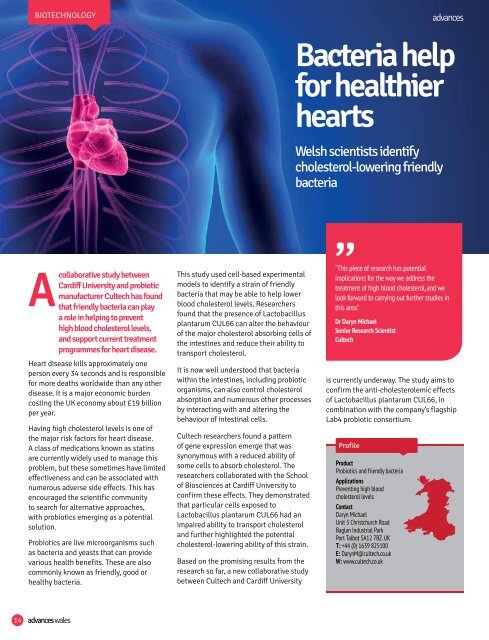advances
s8qx303jAhT
s8qx303jAhT
Create successful ePaper yourself
Turn your PDF publications into a flip-book with our unique Google optimized e-Paper software.
BIOTECHNOLOGY<br />
<strong>advances</strong><br />
Bacteria help<br />
for healthier<br />
hearts<br />
Welsh scientists identify<br />
cholesterol-lowering friendly<br />
bacteria<br />
Acollaborative study between<br />
Cardiff University and probiotic<br />
manufacturer Cultech has found<br />
that friendly bacteria can play<br />
a role in helping to prevent<br />
high blood cholesterol levels,<br />
and support current treatment<br />
programmes for heart disease.<br />
Heart disease kills approximately one<br />
person every 34 seconds and is responsible<br />
for more deaths worldwide than any other<br />
disease. It is a major economic burden<br />
costing the UK economy about £19 billion<br />
per year.<br />
Having high cholesterol levels is one of<br />
the major risk factors for heart disease.<br />
A class of medications known as statins<br />
are currently widely used to manage this<br />
problem, but these sometimes have limited<br />
effectiveness and can be associated with<br />
numerous adverse side effects. This has<br />
encouraged the scientific community<br />
to search for alternative approaches,<br />
with probiotics emerging as a potential<br />
solution.<br />
Probiotics are live microorganisms such<br />
as bacteria and yeasts that can provide<br />
various health benefits. These are also<br />
commonly known as friendly, good or<br />
healthy bacteria.<br />
This study used cell-based experimental<br />
models to identify a strain of friendly<br />
bacteria that may be able to help lower<br />
blood cholesterol levels. Researchers<br />
found that the presence of Lactobacillus<br />
plantarum CUL66 can alter the behaviour<br />
of the major cholesterol absorbing cells of<br />
the intestines and reduce their ability to<br />
transport cholesterol.<br />
It is now well understood that bacteria<br />
within the intestines, including probiotic<br />
organisms, can also control cholesterol<br />
absorption and numerous other processes<br />
by interacting with and altering the<br />
behaviour of intestinal cells.<br />
Cultech researchers found a pattern<br />
of gene expression emerge that was<br />
synonymous with a reduced ability of<br />
some cells to absorb cholesterol. The<br />
researchers collaborated with the School<br />
of Biosciences at Cardiff University to<br />
confirm these effects. They demonstrated<br />
that particular cells exposed to<br />
Lactobacillus plantarum CUL66 had an<br />
impaired ability to transport cholesterol<br />
and further highlighted the potential<br />
cholesterol-lowering ability of this strain.<br />
Based on the promising results from the<br />
research so far, a new collaborative study<br />
between Cultech and Cardiff University<br />
“This piece of research has potential<br />
implications for the way we address the<br />
treatment of high blood cholesterol, and we<br />
look forward to carrying out further studies in<br />
this area.”<br />
Dr Daryn Michael<br />
Senior Research Scientist<br />
Cultech<br />
is currently underway. The study aims to<br />
confirm the anti-cholesterolemic effects<br />
of Lactobacillus plantarum CUL66, in<br />
combination with the company’s flagship<br />
Lab4 probiotic consortium.<br />
Profile<br />
Profile<br />
Product<br />
Probiotics and friendly bacteria<br />
Applications<br />
Preventing high blood<br />
cholesterol levels<br />
Contact<br />
Daryn Michael<br />
Unit 3 Christchurch Road<br />
Baglan Industrial Park<br />
Port Talbot SA12 7BZ. UK<br />
T: +44 (0) 1639 825100<br />
E: DarynM@cultech.co.uk<br />
W: www.cultech.co.uk<br />
14<br />
<strong>advances</strong> wales




